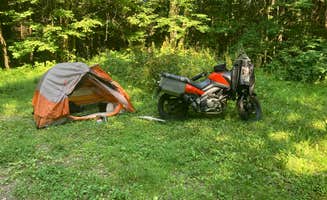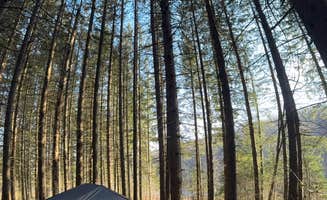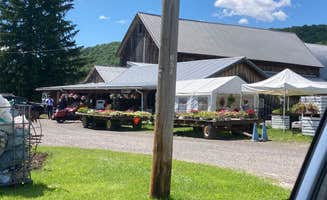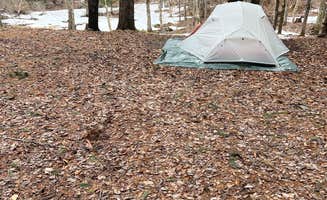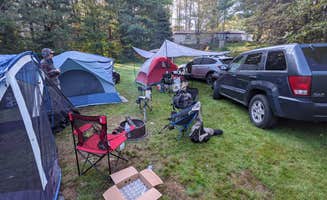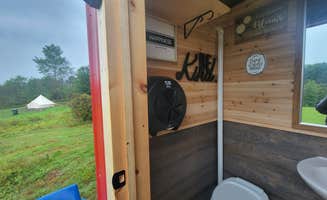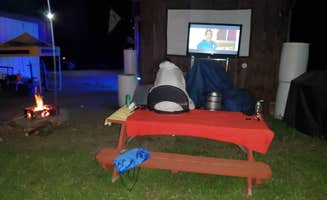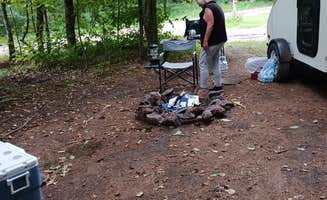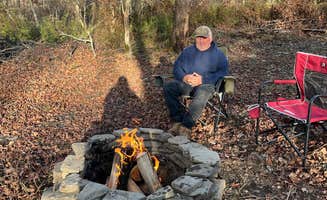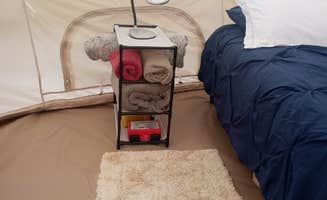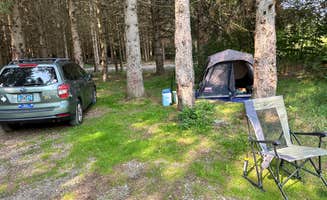Tent campsites near Oneida, New York range from basic hike-in spots to pond-adjacent sites suitable for overnight stays. The region sits within New York's Central Leatherstocking area, with elevations typically between 1,000-1,800 feet and a climate that brings substantial snowfall in winter months and warm, humid summers. Most primitive camping areas follow the standard 14-day maximum stay policy common throughout New York State forestlands.
What to do
Fishing from shore: Access fishing opportunities at Bear Wallow Pond where visitors find "a small parking area and fishing access on a really beautiful pond" with "riotous shoreline wildflowers" in summer and "breathtaking changing leaves" in fall according to campers at Bear Wallow Pond Dispersed Campsite in Pharsalia Woods.
Hiking nearby trails: Explore the Finger Lakes Trail network from Pharsalia Woods Lean-To where a "beautifully maintained primitive group campsite with large Adirondack style lean-to" sits just "twenty minutes hike from trailhead" making it "great for short local camping trips or through hikers" according to experienced hikers at Pharsalia Woods Lean-To Campsite.
Paddling on local ponds: Bring a non-motorized boat to access campsites at Jackson Pond which offers "access from a small parking area and trailhead of the Finger Lakes Trail, or via canoe or non-motorized boats from a nearby boat launch to the north" in a "quiet, peaceful wooded location perfect for individual or group tenting."
What campers like
Natural water features: Campers appreciate Spruce Pond where "you can easily paddle or fish on the pond" with "three sites with their own pond access, and one is actually handicapped accessible with its own accessible fishing landing" according to reviews at Spruce Pond Camping Area.
Wildlife viewing opportunities: Visitors note the active wildlife at Spruce Pond where "animals at the pond are very active and made a lot of noise in the night" creating a natural soundtrack for overnight stays.
Solitude and accessibility: Campers value the balance of remoteness and access at Charles E. Baker State Forest where visitors find it's "beautiful forest with miles of trails" and have "no problem pitching a tent in a secluded spot in the woods" while appreciating that "official camp spots with water access are also free to use."
What you should know
Permit requirements: Some campsites require advance planning as "camping in this DEC Wildlife Management Area campsite is limited, and requires a permit. Visit the regional DEC office at 1285 Fisher Ave., Cortland NY or call 607-753-3095; allow one week for permit to be processed."
Seasonal variations: Facilities change with seasons at Morgan Hill Forest—Onondaga Trailhead campground where "toilet isn't set up yet but will once the season opens" so early season campers should come prepared.
Water sources: Most primitive sites lack potable water requiring visitors to "bring your own or filter from nearby streams" as "there is a perennial spring nearby, but campers should be prepared to filter or treat their water."
Tips for camping with families
Site selection strategy: For tent camping with children, "the first few campsites are the best the further down you go the worse the sites get for tent set up. Smaller tents would be best do here" at Spruce Pond, though there are "great trees for hammock camping."
Group-friendly areas: For family outings, consider larger established areas like those at Hall Island State Forest which has "a handful of primitive sites abutting the Salmon River Reservoir" where groups can spread out with multiple tents.
Safety considerations: Families should note that while campsites may be primitive, many are "not far from either Norwich or South Otselic for an easy overnight or weekend" making them suitable for first-time camping experiences while still having towns nearby for supplies.
Tips from RVers
Road conditions: Access routes vary significantly with Charles Baker State Forest requiring navigation of "a long, but well maintained, dirt road" to reach camping areas.
Alternatives to primitive sites: For those wanting more facilities, commercial options like Stoneys Pineville Campground offer electric hookups, showers, and toilets with "friendly hosts and great place on the river" according to repeat visitors.
Space constraints: Most primitive sites in state forests have limited parking and turning radius, making them better suited to smaller rigs or truck campers rather than large trailers or motorhomes.


